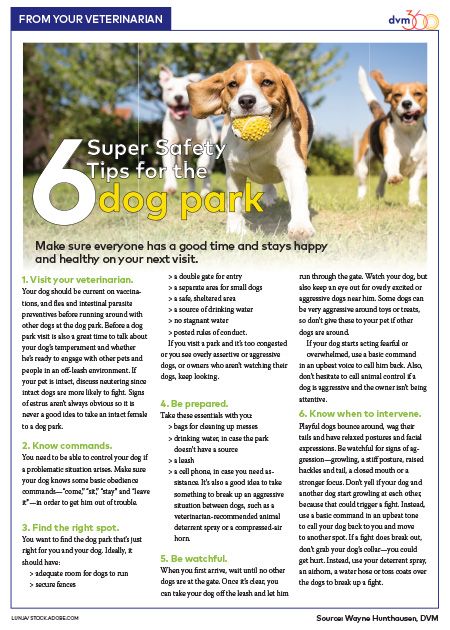Dog park dos and don'ts: What pet owners need to know before joining in the fun
Help your clients to avoid dangerous conditions and snarling dog fights with these tips.
It's fairly common for clients to come to you for advice about squashing their dog's storm phobia or housetraining a new pup, but what about dos and don'ts for trips to the dog park? While some dog owners may proactively look for guidance in the area of socializing and canine aggression, it's not uncommon for others to think a trip to the dog park doesn't require much forethought or preparation-and that's where trouble can arise.
"Aggression is not uncommon at a dog park," says Dr. Wayne Hunthausen, a pet behavior consultant and owner of Westwood Animal Hospital in Westwood, Kansas. "It's certainly something pet owners need to be educated about. There are things they can do to prepare at the park-and even before."
The first thing clients need to know is there's always some risk in taking their dog to a dog park-whether it's risk of injury, infectious disease, fighting or biting. Talk to pet owners about their dog's temperament, age and size, and determine whether the dog is ready to be introduced to other dogs and people. "Not all dogs are "dog park dogs,'" says Dr. Hunthausen. "Some are too afraid or don't know how to play or are too aggressive."
Another important point to emphasize is that dogs need to be current on their vaccinations, flea and intestinal parasite preventives before going to the dog park. Also, consider advising pet owners to have more fecal examinations performed on their dog if they make frequent visits to the park, as the risk of acquiring intestinal parasites is high.
And finally, make sure clients know how to recognize signs of aggression-and can control their dog if a troublesome situation should arise. Simple obedience commands, such as "come," "sit," "stay" and "leave it," are critical in a dog park environment. "Clients need to understand dogs' body language and be able to spot signs of fear or anxiety in their pet or someone else's," says Dr. Hunthausen. "If there's a problem, owners need to be able to intervene and make a situation safer."
To download a client handout on dog park safety tips, head over to dvm360.com/dogparksafety.
